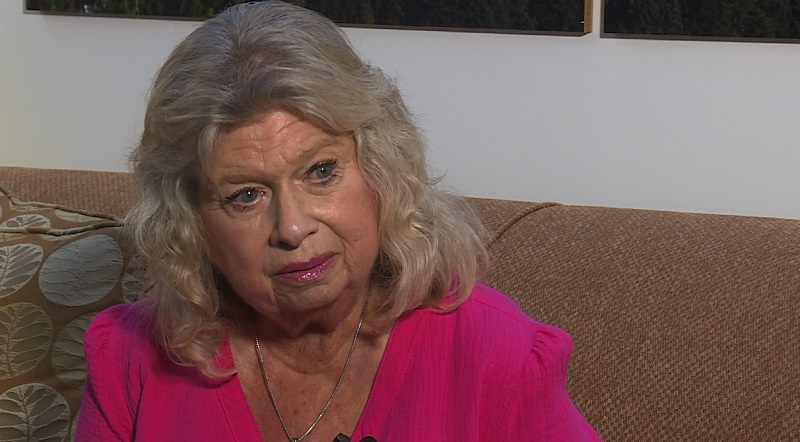PORTLAND, Ore. (KOIN) — After 25 years behind bars for a brutal murder he committed as a teenager, James Anderson was released July 21. Though he was released by the parole board, his case was among the 73 cases of juveniles Governor Kate Brown wanted the parole board to consider for early release through her constitutional power of commutation.
In August 1996, Ellen Pelker’s 17-year-old daughter Mariah disappeared after leaving work at the Woodburn Safeway. About a month later, with her daughter still not found, Pelker told KOIN 6 News, “This is every parent’s worst nightmare, seeing their child’s face on a flyer.”


What happened to Mariah in a hazelnut grove was horrifying.
“(Anderson) begins stabbing her over and over and over again, I think more than 20 times with a 3-inch knife. The co-defendant said she was lying on the ground, moaning,” Pelker said, adding that Anderson was the father of Mariah’s unborn baby.
Mariah survived the stabbing.
“There she was, sitting up against a tree alive, pleading for help, thinking that someone maybe had come to rescue her,” Pelker told KOIN 6 News. “Little did she know it was her murderers who came back. And once he found her alive, he took his shovel out and bashed her skull in.”
In October 2021, Pelker went to a parole hearing to plead for the board to keep Anderson locked up. He was close to completing 25 years in prison on his 25-to-life sentence. While she was there she received troubling and confusing news — Gov. Brown put his name on the list for early release that she wanted the parole board to consider.

“The parole board didn’t know. They were a bit seemingly confused by what was going on from the governor’s office,” Pelker said. “We were very confused, including my attorney.”
Whether the governor can transfer her commutation authority to the parole board resulted in a lawsuit that is now being decided by the Oregon Court of Appeals. But Brown’s action added a layer of uncertainty to Pelker’s heartache.
“I never heard from the governor. She never reached out to me.”
What Oregon gubernatorial candidates say
In recent years, Gov. Brown and the Democrat-controlled Oregon legislature weakened Measure 11 sentencing laws for violent juvenile offenders in favor of rehabilitation and second chances, saying the minds of young offenders are not fully developed.
KOIN 6 News asked the 3 main candidates to succeed Brown as Oregon governor — Republican Christine Drazan, Democrat Tina Kotek and unaffiliated candidate Betsy Johnson — how they would direct policy concerning juvenile offenders.



Drazan said she was absent the day Measure 11 was weakened but she would have voted against. She would not work to undo the law that weakened Measure 11, Senate Bill 1008 but would look to the future to increase law enforcement and compassion for victims.
She told KOIN 6 News she would “rarely” use the governor’s clemency authority.
“We have seen her use her authority of the governor’s office as a way to address her broader political approach to criminal justice, which is that fewer people should be incarcerated,” Drazan said. “So she’s used the power of the executive to do sort of more blanket-style commutations. And I believe that that has been an inappropriate use of that authority.”
Johnson said she would use the clemency power “with humility and much more judiciously. This is out of control.”
Johnson, who has been both a Republican and a Democrat, added that “what has been the saddest for me is the accommodation that has been made for the perpetrators and no accommodation for the victims and their families.”

Kotek, who voted yes on the bill to weaken Measure 11 when she was Speaker of the House in 2019, declined an interview. But she provided a statement and previously touched on the issue.
“I would use the commutation/clemency power with great care, making sure to involve all parties and review all aspects of such an important action on a case-by-case basis,” Kotek said in a statement to KOIN 6 News.
During the May primary debate held at the KOIN 6 News studios, Kotek talked about criminal justice reform.
“Mandatory sentencing, particularly for juveniles, has not necessarily shown to improve the situation for public safety,” Kotek said at that time. “There’s been a lot of effort to make sure we have appropriate sentencing particularly for our young people, who should be held accountable but also to reflect their developmental stage as a younger person.”
‘She was lovely’
After months of painful uncertainty in Ellen Pelker’s mind, James Anderson was not released through the governor’s power of commutation. But he was set free by the parole board.

He was freed despite the fact he changed his story. As the parole board wrote, “the continued unsatisfying nature of the recitation of facts surrounding his crimes” the board found Anderson “…does not suffer from a present severe emotional disturbance that constitutes a danger to the health or safety of the community.”
Asked what her daughter was like, Ellen Pelker replied, “Well, she was lovely, for one thing.”
Pelker sent a letter to Gov. Brown’s office asking her to postpone Anderson’s release or overrule the parole board. But both the governor’s officer and the parole board told KOIN 6 News Brown does not have the power to do that.
“Governor Brown understands that release decisions can be difficult for victims and survivors,” her spokesperson said.
But she did not address whether the governor would meet with Ellen Pelker, despite Pelker telling the governor her actions of putting Anderson on the list for possible commutation made the process of his potential release even more painful.
“I will not rest until my murdered daughter receives the justice and respect she deserves,” Pelker wrote.


